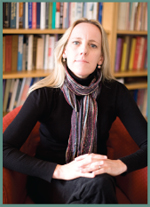An Eschatological View of Climate Change: Bring It On

When I speak to family members, friends, and colleagues about the next presidential election, the overriding question is: Who, among the long and growing list of candidates, has what it takes to beat the incumbent in 2020? Put another way, how can more Americans be inspired to vote for one of these challengers? Of course, reversing or fending off the odious attempts to hinder minority voters from exercising their suffrage is tantamount, as is getting more twenty-and thirtysomethings to the polls.
Because when I think about the issues of importance to humanists, among them church/state separation, LGBTQ rights, fighting racism, and addressing climate change, I see the opposition to these issues is the religious right, and this group votes. Some of its adherents only care about criminalizing abortion. Or that, plus opposing everything that has anything to do with the wellbeing of gay, transgender, queer, and gender-nonconforming people. But what about climate change? Is the religious right ever going to come around to the reality of human-caused global warming and want to elect people interested in doing something about it?
William Bradford Nichols’s cover story on the eschatology behind so many evangelicals’ climate denial is a necessary reminder that white evangelical voters have some really extreme ideas about what humanity is in for. (And, having gone a fair way down the rabbit hole of sorting versions of how it’ll all end, I dare say really confusing ideas. For example, do they want to be raptured or martyred? Do they want the hellish “tribulation” years to come before or after all the good folks depart?)
“Climate change wasn’t something I worried about,” Nichols recalls of his two decades as a Christian. “On the contrary, I welcomed it as a fulfillment of ancient biblical prophecy.” Nichols is part of a growing demographic of progressive “exvangelicals” who’ve left the evangelical world and are increasingly vocal in criticizing it.
“Ex-evangelicals hold a singular potential for undermining evangelical politics,” says Chris Stroop, a journalist with a PhD from Stanford who’s part of the exvangelical movement. “Those who associate with #exvangelical are not leftist outsiders with no real experience within the subculture. They’re former insiders who testify to what they see as the traumatizing effects of living under evangelicalism’s patriarchal, heteronormative, and racist norms.” He notes the exvangelical support group on Facebook has over 4,700 members from across the country and that there are many more former evangelicals identifying as such around the US and nternationally.
In a recent Foreign Policy piece Stroop looked at the influence of evangelicals’ end-times beliefs on US foreign policy, in particular regarding Israel. I asked him about the relationship of radical eschatology to climate policy, and while he thinks the foreign policy connection is the greater danger, Stroop did note evangelicals’ opposition to global institutions like the UN—which is tied to the fear that a “one-world” government will signal the end times. “They work to undermine America’s cooperation with international institutions, and this hampers our ability to work globally to counteract climate change, in addition to causing other serious problems.”
As for exvangelicals, their rising numbers and visibility should be celebrated by humanists. We should also seek common ground with them on issues of tolerance, equality, and support for science, including climate science. “I’ve seen concern about climate change denialism come up many times in exvangelical discussions,” says Stroop. “It seems clear to me that a substantial majority of those of us who consider ourselves ‘exvies’ see climate change as an important issue that needs to be addressed, and that we are distressed at white evangelicals’ refusal to grapple with it in a serious way.” So, what about the whole voting issue. Can we count on the exvies? “The thing about being raised in a hardcore authoritarian ideological subculture and mobilized for the culture wars is that it politicizes you and gives you certain tools for activism and political engagement,” Stroop responds. “You don’t lose that politicization and preparation for political activity when you switch sides in the culture wars; you just redirect it.” Three cheers for that.
